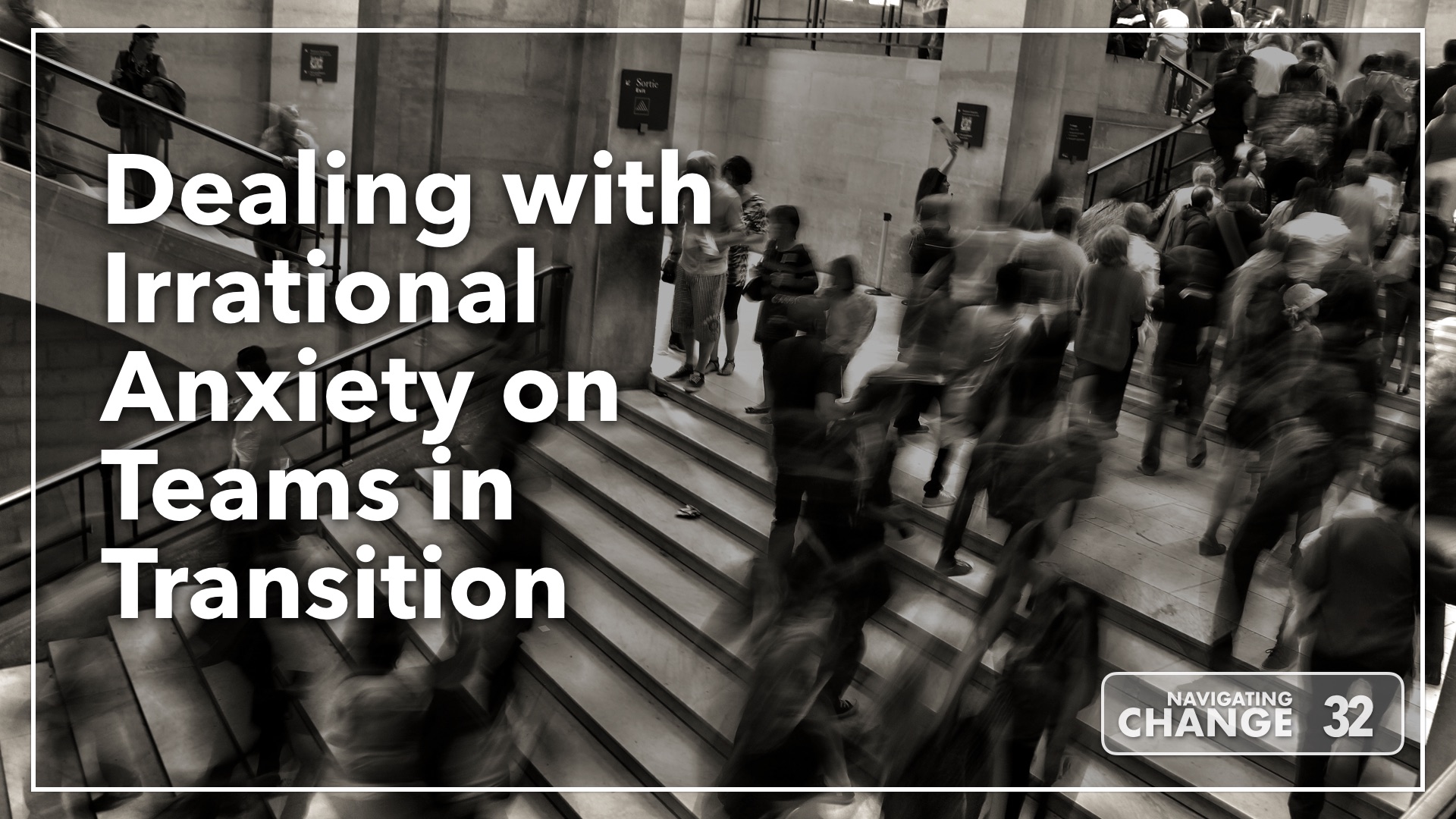Working with a consultant on your change initiatives — internal or external — requires a shared understanding of expectations. But more important is a clear understanding of what it is you need your consulting partner to deliver. This week on Navigating Change, Howard Teibel and Pete Wright discuss the role of the consultant, the importance of "hired experience," and what it means to partner with an outsider when your internal environment is one of significant complexity.
32: Dealing with Irrational Anxiety on Teams in Transition
When we're faced with jarring change — new role, new boss, merged organizations — we are often dealt with a complex individual emotional response. That response is magnified when it comes to team performance, but often for all the wrong reasons. This week on Navigating Change, Howard Teibel and Pete Wright take on the anxiety that comes with big change, and discuss how team responses can impact the transformation you're striving for.
28: Turning Effective Listening into Action
Active listening is a key skill. But while it's important to be able to listen well to teams in a period of transformation, it's even more important to be able to turn what you're observing into action. This week on the show, Howard Teibel and Pete Wright talk about the power of active listening in change processes, and how great leaders turn that skill into action on their teams.
27: Uncovering the "Why" — Part 3
Click to Enlarge
This week on Navigating Change, Howard Teibel and Pete Wright conclude their three-part discussion on a robust decision-making process and the importance of uncovering the "why" of every change initiative. In this episode, we talk about how best practice organizations turn outcomes of change initiatives into action.
26: Uncovering the "Why" — Part 2
Click to Enlarge
This week on Navigating Change, Howard Teibel and Pete Wright continue their three-part discussion on a robust decision-making process and the importance of uncovering the "why" of every change initiative. In this episode, we cover brainstorming and the critical importance of strong leadership in the process.
25: Uncovering the "Why" — Part 1
Click to Enlarge
This week on Navigating Change, Howard Teibel and Pete Wright begin a three-part discussion on a robust decision-making process and the importance of uncovering the "why" of every change initiative. In this episode, we cover the foundational elements and visioning structure that helps teams understand the foundation of their change story, and how to connect with it as a team at new levels of depth.
24: Navigating Loyalty
Loyalty is a tricky subject made only more complicated when it comes to change initiatives. This week on the show, Howard Teibel and Pete Wright take on loyalty — to a person, to an institution, or to a cause — and discuss how an evolving sense of loyalty impacts teams.
21: Strategic Planning and Leading from the Seat You're In — Howard Teibel at NCAA-NACUBO 2013
At this year's NACUBO Annual Workshop, Howard Teibel will join NCAA business officers for a rich discussion on the nature of leadership, communication, and broadening the contribution to the strategic planning process.
In the latest episode of the Navigating Change podcast, Teibel shares his objectives for the session, encouraging business offers to get ready to think bigger than their functional roles.
The surprise for business officers, according to Teibel, is that these individuals are often uniquely equipped to contribute to the strategic planning process because of their access to data across the organization.
Since the economic crisis, more and more people in those areas are discovering — and being asked by their vice presidents and presidents themselves — 'we need you to play a central role not just in getting us the data, but helping to figure out how to lead us through this.'"
The transition that is occurring in organizations moving toward strategic planning process maturity is that business officers and team members are learning that the data they cultivate, and their unique ability to interpret it, is a key strategic asset to the organization. Building a framework for turning that asset into a productive contribution to the organization — and to moving new initiatives forward — can be daunting.
In his time with NCAA business officers, Howard Teibel will help not only build that framework for approaching strategic planning, but give tools to business officers to help increase productive communication and demonstrate a new kind of leadership.
The NACUBO Annual Meeting is July 13-16, 2013. This special NCAA workshop will take place July 14-15. For more information, please visit nacuboannualmeeting.org, and check back here soon for more information on all of Teibel, Inc.'s events and presentations in Indianapolis. See you there!
18: Building Your Vision 2020 Part 4 – with John Eldert and Howard Teibel
Academic planning often adopts the business approach to strategic planning. The results are predictable: clear, measurable outcomes; tight, pithy vision statement; focused strategy targeting a clear and "directable" organizational culture. But these assumptions don't fit the higher education planning environment, with many parallel lines of activity, complex vision, and an environment that is often far more self-directed. This week on the show, we bring you part four of our conversation with John Eldert, Vice President of Administration at Berklee College of Music as he joins Howard Teibel to discuss their work on adapting the business approach to strategic planning for higher education.
17: Building Your Vision 2020 Part 3 – with John Eldert and Howard Teibel
Academic planning often adopts the business approach to strategic planning. The results are predictable: clear, measurable outcomes; tight, pithy vision statement; focused strategy targeting a clear and "directable" organizational culture. But these assumptions don't fit the higher education planning environment, with many parallel lines of activity, complex vision, and an environment that is often far more self-directed. This week on the show, we bring you part three of our conversation with John Eldert, Vice President of Administration at Berklee College of Music as he joins Howard Teibel to discuss their work on adapting the business approach to strategic planning for higher education.
16: Building Your Vision 2020 Part 2 – with John Eldert and Howard Teibel
Academic planning often adopts the business approach to strategic planning. The results are predictable: clear, measurable outcomes; tight, pithy vision statement; focused strategy targeting a clear and "directable" organizational culture. But these assumptions don't fit the higher education planning environment, with many parallel lines of activity, complex vision, and an environment that is often far more self-directed. This week on the show, we bring you part two of our conversation with John Eldert, Vice President of Administration at Berklee College of Music as he joins Howard Teibel to discuss their work on adapting the business approach to strategic planning for higher education.
15: Building Your Vision 2020 Part 1 – with John Eldert and Howard Teibel
Academic planning often adopts the business approach to strategic planning. The results are predictable: clear, measurable outcomes; tight, pithy vision statement; focused strategy targeting a clear and "directable" organizational culture. But these assumptions don't fit the higher education planning environment, with many parallel lines of activity, complex vision, and an environment that is often far more self-directed. This week on the show, we bring you part one of our conversation with John Eldert, Vice President of Administration at Berklee College of Music as he joins Howard Teibel to discuss their work on adapting the business approach to strategic planning for higher education.
14: The Importance of Training as a Team
We underestimate what it means to collaborate. The result is often a catalog of missed opportunities for improving function across the organization, which comes at the expense of systems training and technology solutions for simple problems. This week, Howard Teibel joins Pete Wright with a few suggestions for team cross-training -- ensuring that teams are aligned across departments and functions, and that process, not just systems, are tested all along the line.
13: The 15-Minute Meeting
We’ve all been there -- the eternal ineffective meeting. The facilitator labors on and on, agenda lost long, long ago, with no end in sight. But it is possible to hold effective meetings; meetings with focus, attention, participation, and accountability -- and it all starts with a collective understanding of the rules of the field. In this episode, Howard Teibel and Pete Wright outline those rules and provide suggestions for all who are plagued with ineffective meeting-itis on how to spark the right team behaviors and get back on track.
11: We’re always selling
Walk into your next management meeting and tell your team that you think they need to learn to sell better, you're likely to feel a chill enter the room. Sales has a tough reputation inside organizations. And yet, so many core skills from the art of selling apply perfectly to the interactions we engage in day to day. This week on the show, Howard Teibel and Pete Wright discuss how we are always selling something, whether it's a project idea, a need for partnerships among business units, or influencing a group to buy into a new direction. Selling is ultimately about listening, then conveying how your idea meets another's need. It's about great communication and negotiating skills, something all of us can continue to improve on.
10: Strategies for Building an Effective Retreat
Holding a strong retreat takes planning and strategy to rally teams and build commitment. The best retreats offer a chance to capture institutional intelligence and align teams to strategic vision. The worst retreats are chaotic and unaligned, and can leave your team jaded and disorganized as a result.
6: Process Mapping
One of the great challenges to efficiency across organizations lies in being able to clearly communicate how work gets done, and who's doing it. Before Visio, we did it through detailed policy manuals and word-of-mouth, but these hand-me-down techniques often missed key elements of process, focusing instead on constraints rather than delivering results. This week on the show, Howard Teibel and Pete Wright dissect this issue, and talk about just how important clear, visual process maps can be in communicating the work of the organization.
3: Working in Virtual Teams: Motivating Teams and Learning Tolerance
How we define "teamwork" has changed drastically. Not just in the last decade, either. In fact, the rapid evolution of communication and technology has thrust together projects and teams distributed around the world. Even with the challenges that come with such an arrangement, the expectations are the same: deliver results. This week on the show, Howard Teibel and Pete Wright take on just these issues, and provide insights and tools to help you navigate the change that comes with these new teamwork arrangements.
2: Canary in the Coal Mine: How do you know when your teams aren’t functioning?
One great truth about managing projects and complex teams is that even the savviest of managers stands the chance of missing key cues when their teams begin to suffer. This week on the show, Howard Teibel joins host Pete Wright to take on this issue and provide strategies for maintaining open communication and increasing the effectiveness of teams in the process.







